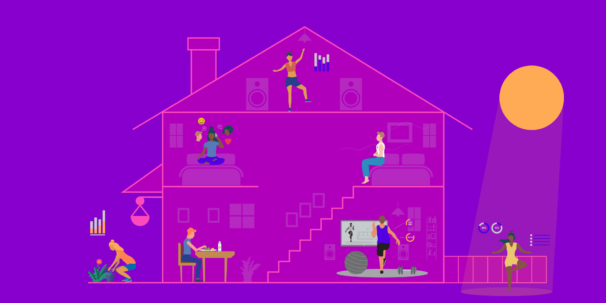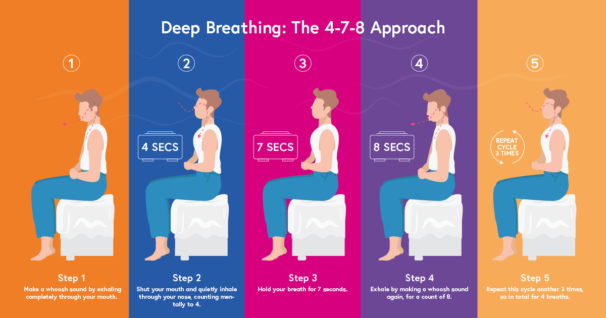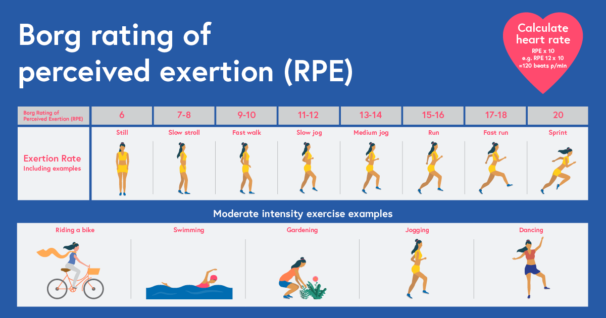How to stay healthy during lockdown
Our guide on how to stay healthy during lockdown looks at some ways to keep on top of your mental and physical wellbeing.

As the COVID-19 lockdown continues to keep many of us at home, it can be easy to fall into bad habits. The detrimental psychological and physical effects of lockdown are well documented.
During these difficult times, your mental and physical health need a bit of support. So, we’ve gathered together some ideas on how to stay healthy during lockdown. Hopefully, they can give you some inspiration as the lockdown continues.
How to look after your mental health
With all the change and uncertainty in life at the moment, taking care of your mental health has never been more important. There are several benefits associated with positive mental wellbeing, including things like:
- reduced stress and anxiety
- improved moods and clearer thinking
- a greater sense of calm and increased self-esteem
- improved relationships.
Understand your own mental health needs
For some people, talking about mental health issues can be difficult. They may not know exactly what their feelings are and how to express them. Although this can seem challenging at first, getting to understand your own needs is an important first step towards managing mental health and stress.
There are several elements worth considering as you try to understand your mental health needs. A good place to start is to find some quiet time in which you can reflect on how you’re feeling. Some questions to ask yourself might be:
- Have you been more irritable with situations or people around you?
- Have you been less interested in activities you usually like?
- Have you found it difficult to concentrate?
- Have you been sleeping more or less than usual?
- Have your changed routines had an impact on your sleep?
- Have you been eating more or less than usual?
- Have you felt overwhelmed and like there is too much to do?
- Have you felt concerned about the future? What aspect specifically?
- Have you been able to get enough time to yourself to relax?
- What sort of activities usually help you ‘reset’ when you’re not feeling yourself – have you been able to do them?
It’s a difficult and strange time for everybody, so changes to routine and anxiety are a normal response to the circumstances. But recognising which parts are particularly difficult, or understanding exactly how you feel about them, is an important step in trying to improve your mental health.
As this BBC video explores, feeling in control can go a long way to helping you feel better. So, think about how you’re feeling, what your worries are, and what things are stressing you out. Try writing these points down to give you some clarity, and decide what you have control over and can take proactive steps with.
There are also several tried and tested methods that are proven to help people in various situations deal with trying times such as the COVID-19 pandemic.
If you’re concerned about your own mental health needs, the NHS has a mood self-assessment tool that can help you understand how you’ve been feeling. For young people who are struggling during the lockdown, we also have a course on helping young people manage low mood and depression.
Practice mindfulness exercises
Mindfulness is a practice that is beneficial no matter what’s going on in the world. If things seem a little stressful at the moment, and you’re finding it hard to focus, it could be the ideal remedy. But what is mindfulness?
Put simply, being mindful is the act of being fully present and aware of where you are and what you’re doing. It’s something that all people can do, although few of us take the time to actually spend doing it. However, it can be a great first step when discovering how to stay healthy during lockdown.

Practising mindfulness can help to reduce stress and anxiety, improve your memory, and help with concentration. And maintaining a mindful life can benefit your emotional health, relationships and communication skills now and in the future.
A great place to start with mindfulness is with some basic breathing exercises. Take one minute out of your day to sit and focus on your breath. Notice the air going in and out of your nostrils as your chest rises and falls. If your mind wanders, gently bring it back to focus on your breathing.
If you want to learn more about mindfulness techniques for various purposes, check out our course on mindfulness for wellbeing and peak performance.
Stay in touch with friends and family
In these difficult times, it’s important to focus on some of the positives in our lives. One such positive is our access to technology, and how it can be such a powerful tool for bringing us together. With our smartphones, internet access, webcams, and other methods of communication, it’s never been easier to stay in touch.
Although many of us can’t see friends and loved ones face-to-face at the moment, we can still keep in touch. Speaking with the people you care about can give you (and them) a mental boost.
There are plenty of ways you can keep in touch:
- Call your friends and family. Try and arrange to speak with different people throughout the week. It can give you something to look forward to and keep you feeling social.
- Arrange an online activity. There are plenty of apps and services that let multiple people voice and video chat together. Play games, tell stories, and catch up remotely. You can even do things like have a murder mystery party or set up a pub quiz.
- Send messages. Try reaching out to some people you’ve not spoken with in a while, even if it’s just a message to say hi.
- Write letters. If you’re feeling old school and you have the means, now might be a good time to write to someone you care about.
Try to keep busy
Although it can (understandably) be hard to feel motivated and productive at the moment, keeping your mind active can be beneficial for positive mental health.
If you’re looking for some inspiration, we’ve already compiled a list of 50 free things to do during lockdown.
Now is the perfect time to explore your hobbies – or find some new ones. Challenge yourself to read that book you’ve been putting off, start that journal you’ve always wanted to keep or kick off your exercise regime.
Get enough sleep
Sleep plays a fundamental role in mental health. However, when daily life gets disrupted, it’s easy to fall into bad sleep cycles. As this post from SleepFoundation.org outlines, there are many challenges people are facing with their sleep at the moment, with added stress, a disrupted schedule, and excess screen time all causing issues.
By identifying a potential issue, you can work on understanding the habits, solutions and strategies for dealing with sleep deprivation.
Try and focus on maintaining a regular bedtime and avoid the temptation of lying in bed for ages in the morning or during the day. Take some time to wind down at the end of the day and avoid having caffeine or alcohol late at night.
Stay physically active
As well as taking care of your mental health during lockdown, it’s equally important to stay on top of your physical wellbeing. With gyms closed and the daily commute cancelled for most of us, it can seem more difficult to stay active. However, there are plenty of ways you can keep your body moving.

Get moving
The hardest part about being active during lockdown is starting in the first place. The sofa looks extra inviting at these times, and the bed extra comfortable. But try and resist the temptation to spend all of your time there. In the UK, people can still get out and exercise during lockdown, so make sure to take advantage of that.
In our post on how to find a new hobby in lockdown, we looked at a variety of new hobbies you can take on to keep you fit. Whether it’s running, dancing, cycling or weight lifting, there are plenty of activities you can pick up inside and outside the home. Choose one and get active!
Find a routine
Now you’ve started being active, the key thing is to stick with it. The NHS recommends that adults aged 19 to 64 need to do at least 150 minutes of moderate-intensity activity a week. This includes being active every day and doing strengthening activities at least twice a week.
So, what does ‘moderate-intensity activity’ look like? Well, things like brisk walking, riding a bike, dancing, and rollerblading all count. You can try and beat your daily steps target, follow a daily exercise YouTube channel, or try a couch to 5k program.
Try yoga
Yoga is good for the body and mind, and it’s something that just about anyone can do. As well as burning calories and toning muscles, it gives you strength, flexibility, and an awareness of your mind and body.
We mentioned the benefits of mindfulness earlier in this post, and yoga can help with that too. It encourages you to relax and focus on your breathing, stimulating your nervous system. What’s more, you’re sure to be able to find a workout that’s suitable for your fitness and ability level.
The YouTube channel Yoga With Adriene gives a wide range of exercises and workouts that can help set you on your way.
Get your Black Belt – Online
Many martial arts studies have got creative in solving the “no contact” problem of martial arts training. Skype/Zoom training being the main solution. It’s amazing just how professional it’s become with a trainer and producer working together, muting certain students, displaying the student currently being coached centrally on the screen etc. It’s not the same as being in the Gym, but it’s a lot more interactive than a YouTube video.
Set yourself a challenge
When it comes to fitness, gradual progress can lead to some pretty significant results. If you’re thinking about how to stay healthy during lockdown, taking a fitness challenge could be exactly what you’re looking for.
There are some great ways you can challenge yourself from home, without the need for any extra equipment. Will you try and complete 100 press-ups in one go? Or is your aim to hold a plank for three minutes?
These types of challenges are a great way of giving yourself regular, progressive exercise. You can see gradual progress, and have an end goal in sight. You can also challenge your friends and family to take up the challenge with you from their homes, keeping you connected and competitive.
Maintain a healthy, balanced diet
If you’ve been working from home or furloughed recently, you’ll no doubt have noticed the benefits of having your own kitchen nearby at all times. You may find yourself eating more of all the wrong things, which, although comforting at the time, can be problematic.
There are so many benefits associated with having a healthy and balanced diet. It’s good for your heart, your bones, your immune system, and your mental health. So, maintaining a healthy diet during lockdown is something we should all think about.
Learn about healthy eating
The term ‘healthy and balanced diet’ can sometimes seem like a difficult one to understand. We’re often bombarded by messages and advertisements about food that seem to conflict each other, so how do we know what’s healthy?
Well, we can start by understanding the basics of nutrition. Learning about how what we eat impacts our bodies and minds is a good place to start.
The NHS Eatwell Guide is also an excellent resource for understanding what a balanced diet looks like. It provides information about the types of foods we should include in our daily intake, and why they’re important.
If you want to dig a little deeper, you can take a course on topics such as the relationship between nutrition and wellbeing, and how to improve mental health through diet and nutrition.
Keep hydrated
One aspect of healthy eating that’s sometimes overlooked is choosing healthy drinks for your daily routine. Keeping hydrated is essential for staying healthy, and it brings many other benefits besides.
If you’re exercising a lot, you’ll want to make sure you’re drinking plenty. Many activities can feel physically and mentally much more difficult without proper hydration. Similarly, without enough fluids, you’re more likely to have a hard time concentrating and feeling alert.
So, staying hydrated can prevent you from feeling physically and emotionally drained. But how much should you drink? According to the Eatwell Guide, you should aim for six to eight glasses of fluid a day. This includes things like water, tea, and coffee.
Try a new recipe
Cooking can be a great way to relax and try something new. If you’re looking to put your newly found nutritional knowledge to the test, trying a new recipe is a great excuse.
The BBC Good Food website has a wide selection of healthy recipes. You can even get creative with whatever ingredients you’ve got in the fridge. Experiment with new flavours, try a dish you’ve always wanted to, or cook up your restaurant favourites.
Various studies have shown links between home cooking skills and healthy diets. So, once you’re in the habit, you can maintain your healthy diet during lockdown and beyond.
Reduce your alcohol intake
A recent UK study found that around 21% of the alcohol drinkers they surveyed were drinking more during lockdown.
Although it can seem like a way to escape the stress, in reality, alcohol causes more problems than it solves. For starters, it can interrupt your sleep patterns. So, although it may make you doze off quicker, it can prevent you from getting a restful night’s sleep.
There is also evidence that stress drinking can result in greater feelings of depression, anxiety, and low mood. So, it can be a good idea to limit how much you’re drinking during lockdown.
Government advice is that you shouldn’t exceed more than 14 units per week, which equals around six or seven drinks. However, they also suggest you should have a few drink-free days each week.
Staying healthy is a habit
Evidently, it’s vital that we all take care of our physical and emotional health during this difficult time. In doing so, we’re better placed to look after ourselves and others.
With some simple changes to your daily routine, such as getting enough sleep, eating well, exercising, and keeping in touch with people, you can boost your mood and stay healthy.
-

 Leiden University Demystifying MindfulnessPsychology & Mental Health,Politics & Society
Leiden University Demystifying MindfulnessPsychology & Mental Health,Politics & Society




